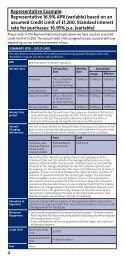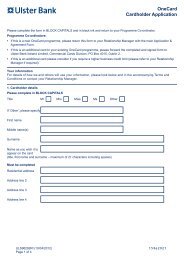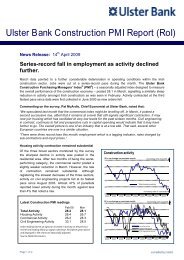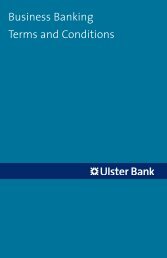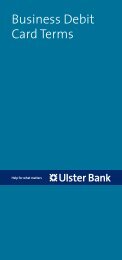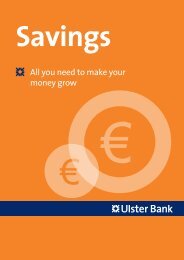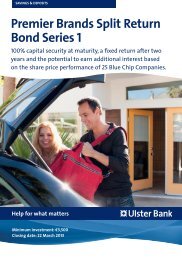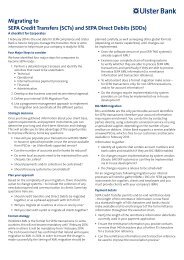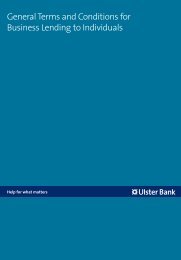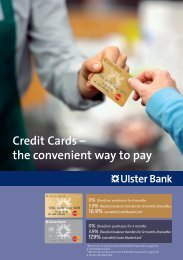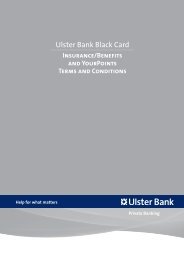Growing your business through franchising - Ulster Bank
Growing your business through franchising - Ulster Bank
Growing your business through franchising - Ulster Bank
Create successful ePaper yourself
Turn your PDF publications into a flip-book with our unique Google optimized e-Paper software.
“Coming together is a beginning<br />
Keeping together is progress<br />
Working together is success...”<br />
Henry Ford<br />
A guide to<br />
<strong>Growing</strong> <strong>your</strong> <strong>business</strong><br />
<strong>through</strong> <strong>franchising</strong>
Index<br />
Introduction 1<br />
Current trends in the Irish marketplace 2<br />
What is <strong>franchising</strong> 3<br />
Franchising terminology explained 3<br />
Types of Franchise 4<br />
Key advantages 5<br />
Main disadvantages 6<br />
Areas that you and <strong>your</strong> management need to consider 7<br />
Funding <strong>your</strong> franchise development 7<br />
What next 8
...Like Ford our people understand the importance of great partnerships, thinking<br />
in answers rather than questions we ensure franchisors and franchisees receive the<br />
support they need to achieve success.<br />
<strong>Ulster</strong> <strong>Bank</strong><br />
Success built <strong>through</strong> teamwork<br />
Latest trends highlight that <strong>franchising</strong>, as a means in which to grow a <strong>business</strong>, continues in popularity and success.<br />
There are now over 270 franchise brands employing in excess of 25,000 people in Ireland. As a successful owner of a<br />
well established brand, now might be the time to look for that next stage of growth - and as you explore which<br />
growth strategy to pursue - <strong>franchising</strong> as a viable <strong>business</strong> option may just be it.<br />
<strong>Ulster</strong> <strong>Bank</strong> has more than 25 years experience in supporting <strong>franchising</strong> customers. Our people are in the<br />
<strong>business</strong> of supporting <strong>business</strong> ideas every day. They understand and have the benefit of previous experience to<br />
help you get the answers you need to make an informed decision. We work with franchisors across a diversity of<br />
sectors ranging from casual dining to outsourced <strong>business</strong> services. We have extensive experience working with<br />
both Irish and international Franchises.<br />
Our customer commitment is evidenced by our four times winner of KPMG Business <strong>Bank</strong>ing Excellence Award,<br />
for which we are very proud.<br />
Our Team of Enterprise and Franchise Advisors are committed to helping you get <strong>your</strong> franchise established.<br />
This guide aims to introduce you to the world of <strong>franchising</strong> and the key issues you could consider before<br />
becoming a Franchisor.<br />
To discuss <strong>your</strong> plans with an <strong>Ulster</strong> <strong>Bank</strong> Enterprise Advisor simply e-mail <strong>your</strong> details to<br />
<strong>franchising</strong>@ulsterbank.com or call 1890 314151.<br />
1
Current trends<br />
in the Irish marketplace<br />
With the fastest level of entrepreneurship in Europe, 1 in 12 people are currently looking to set up a<br />
new <strong>business</strong>. This competitiveness and confidence has bolstered a rapid expansion within the<br />
<strong>franchising</strong> sector. Sales of products and services <strong>through</strong> <strong>franchising</strong> outlets have increased by<br />
42% in the past 3 years. The 2006 industry report on Franchisee Satisfaction by Franchise Business<br />
Review, report that 72% of current franchisees believe in the growth opportunity for their <strong>business</strong><br />
is very strong. This confidence and increase in sales has shifted the perception that <strong>franchising</strong> is<br />
only for the fast food sector. Its popularity is now growing to attract diverse <strong>business</strong> models such<br />
as printing and clothing manufacturers.
“What is <strong>franchising</strong>”<br />
Franchising is, in effect, a system for marketing goods or services. You, the franchisor grant’s a licence to<br />
franchisees to operate a <strong>business</strong> under their name and system to market <strong>your</strong> products and/or services for a<br />
specified period. The franchise agreement is usually subject to renewal so long as the terms have not been<br />
defaulted by the franchisee.<br />
You will receive an initial fee for training the franchisee and assist with the launch of their <strong>business</strong>. In return you<br />
get to share in their success. A return on investment is normally obtained <strong>through</strong> receiving a management<br />
services fee by way of a percentage of the franchisee’s turnover, or <strong>through</strong> a mark-up on the goods they supply.<br />
This close inter-dependence is unique to <strong>franchising</strong>. It’s a major factor, in making the system different from other<br />
<strong>business</strong> opportunities, such as agencies and distributorships. That is not to say that there is anything wrong with<br />
other systems. In fact, one of the first questions you will need to determine is which type of <strong>business</strong> arrangement<br />
would be the most appropriate for <strong>your</strong> particular company’s expansion. Potential franchisees will be more<br />
interested in the more popular franchises that have a visible presence in the marketplace.<br />
Franchising “terminology” explained<br />
Franchisor<br />
You. The franchisor is the developer (person/company) of a product or services, who offers investors the right to<br />
trade under the franchisor’s <strong>business</strong> name. The franchisor also provides support in setting up the franchise and<br />
in its ongoing operations.<br />
Franchisee<br />
A franchise is a <strong>business</strong> arrangement where the owner of a product, a service or even a recognised trade name<br />
agrees, for a fee, to allow a person/company to trade using the same product service or trade name, and passes<br />
the benefit of it’s know-how to that person/company.<br />
Business Concept<br />
Your tried and tested method and systems of operating <strong>your</strong> <strong>business</strong>. Since, it is this experience that interested<br />
the franchisee in the first place and makes <strong>your</strong> current <strong>business</strong> a viable <strong>franchising</strong> model. It sets the standard<br />
to which all subsequent outlets should operate.<br />
A Franchisee<br />
The term given to a <strong>business</strong> arrangement where you (as owner of a product/service or brand) agree to a third<br />
person/company to trade using the same product/service or brand. A usage fee is agreed between you both and in<br />
addition you pass on <strong>your</strong> <strong>business</strong> acumen to the new start up team.<br />
Franchising agreement<br />
Typically it will cover:<br />
■ The conditions of franchise<br />
■ The obligations of both parties<br />
■ The duration of the agreement<br />
■ The territory in which the franchisee will operate<br />
■ The payment or fees arrangement<br />
■ Termination conditions<br />
■ Renewal entitlements<br />
■ Disposal provisions<br />
3
Types of Franchise<br />
Investment Franchise<br />
Having invested a substantial amount of capital the franchisee retains overall control, employing a management<br />
team and staff to run the <strong>business</strong> on a day-to-day basis.<br />
Executive Franchise<br />
This is based on providing the type of services usually described as “white collar” or professional.<br />
Retail Franchise<br />
The franchisee will buy the right to run one or more retail outlets, employing their own staff and displaying and<br />
selling only those products or services that the franchisor approves.<br />
Distribution Franchise<br />
The franchisee will be working from a depot owned and run by the franchisor, operating their own rounds and<br />
delivering products approved by the franchisor within a defined area.<br />
Depot Franchise<br />
In this instance, the franchisee runs their own depot, servicing a mixture of trade and retail customers.<br />
Job Franchise<br />
This is usually a one-person <strong>business</strong> that the franchisee could run from own home.<br />
You will find that a wide range of different types of <strong>business</strong> use the various franchise methods described above.<br />
Examples<br />
■ Building services<br />
■ Catering – from fast food restaurants to hotels<br />
■ Cleaning services – both commercial and domestic<br />
■ Direct selling and distribution<br />
■ Domestic services such as kitchen and bathroom<br />
■ Employment and training agencies<br />
4
Key advantages<br />
1 Reduced Capital Risk<br />
Increased potential to expand as <strong>your</strong> <strong>business</strong> can use the capital of <strong>your</strong> franchisee’s<br />
so <strong>your</strong> own financial commitment is reduced.<br />
2 Ability to Expand Rapidly<br />
Since the franchisee’s will deliver and manage their own individual operations.<br />
Your franchisee recruitment programme should maintain <strong>your</strong> growth schedule with less<br />
capital outlay from you.<br />
3 Access to local marketing knowledge and contacts<br />
Which is part of what <strong>your</strong> investment franchisees bring.<br />
4 Removes the need for additional staff and property locations<br />
You will need fewer staff at head office and in the field than a conventional <strong>business</strong><br />
because the franchisees are self-motivating.<br />
5 Possibility for international expansion<br />
The franchise system lends itself particularly well to international expansion. The benefits of<br />
opening in a foreign country <strong>through</strong> a master franchisee are similar to those of appointing<br />
franchisees in <strong>your</strong> own domestic market but of course, on a much larger scale.<br />
Key criteria for success<br />
■ Clear identity<br />
■ Proven track record<br />
■ Established gap in the market for <strong>your</strong> product and key customer targets<br />
■ Experienced and efficient management support systems<br />
■ Defined operational methods<br />
■ Healthy Profit Margins<br />
■ Strong marketing and branding programmes<br />
■ Established Business System<br />
■ Easily and quickly transferable knowledge
Main disadvantages<br />
1 Reduced Profit Margins<br />
You don’t own the branches so you do not make the same level of profit as a company-owned<br />
chain. This is expected, as it is the franchisees that invests the capital to open the branches.<br />
2 Less control<br />
You have less direct control over the network than you would have if it were company operated.<br />
You will however be able to terminate a contract with a franchisee that doesn’t follow <strong>your</strong> system.<br />
3 Misuse of Business System<br />
You pass on the rights to the franchisee to use <strong>your</strong> trade mark and <strong>business</strong> system. You need to<br />
be sure that you have some recourse if they are misused, particularly if the franchisee decides to<br />
leave the network and set up in competition, using the knowledge you have provided.<br />
4 Lack of Motivation<br />
You need to select <strong>your</strong> franchisees with great care to ensure that <strong>your</strong> network reaches its full<br />
potential. It can be difficult to motivate franchisees that have reached their “comfort zone”. You<br />
need also to allocate <strong>your</strong> territories or locations effectively to maximise the national potential of<br />
<strong>your</strong> <strong>business</strong>.<br />
5 Franchise Selection<br />
Your rate of growth will be determined by <strong>your</strong> ability to attract franchisees and the availability of<br />
candidates who have sufficient capital and are of the right calibre. It is normally a progressive<br />
development starting at a cautious pace and gradually gaining momentum.<br />
6
Areas that you and <strong>your</strong> management<br />
team need to consider<br />
1 Your current Business Growth strategy<br />
Does Franchising support the growth strategy you are looking for<br />
2 Customer growth potential<br />
Are there more customers with an appetite for <strong>your</strong> product or service<br />
3 Protection of <strong>your</strong> USP<br />
While easily transferable knowledge is important for success, put in place robust systems that ensure<br />
its not so easily copied and therefore devalued.<br />
4 Funding<br />
Investment costs typically range from E50,000 to E300,000. Royalty period payments can be lengthy. This can<br />
play havoc with cash flow. A detailed financial plan is vital to ensure that you can support <strong>your</strong> initial<br />
development costs and give <strong>your</strong> <strong>franchising</strong> <strong>business</strong> its best possible start.<br />
5 Determining the skills levels of the franchisees with which you partner<br />
The gaps they may have in understanding <strong>your</strong> industry or sector will need to be filled by training and<br />
investment on <strong>your</strong> behalf.<br />
6 Ongoing investment of <strong>your</strong> time on profit monitoring<br />
Your experience will be responsible for carrying out turnover audits for the franchisee. This unique partnerships<br />
ensures <strong>your</strong> experience supports the success of the people who set up a franchise.<br />
7 Would an alternative <strong>business</strong> model be more suitable<br />
Franchising may not be the solution and at this point its worthwhile exploring as many options as you can.<br />
Funding Your Franchise Development<br />
As the cost of developing a franchise can range anywhere from 50,000 to 300,000 and the waiting period for<br />
income royalties can be lengthy, you will need to develop a detailed financial plan. While awaiting income royalties,<br />
the <strong>business</strong> or some other source must be able to support development costs.<br />
The primary source of funding for franchise development is from cash generated from <strong>your</strong> established profitable<br />
<strong>business</strong>. Franchisable <strong>business</strong>es will have proven their success by generating profit and positive cash flow. This<br />
cash flow may allow you to raise short and medium term debt to fund the development of <strong>your</strong> franchise brand.<br />
Costs Include<br />
■ Finance of pilot<br />
■ Development of brand<br />
■ Management recruitment<br />
■ Franchisee selection and management process<br />
■ Development and maintenance of operations manual<br />
7
What next<br />
■ Carry out further research as to the viability of <strong>your</strong> current <strong>business</strong> model<br />
■ Bring together a strong support team to help. Some of these may already be part of <strong>your</strong> current <strong>business</strong><br />
support system e.g. <strong>franchising</strong> consultant, an accountant, a market research consultant, solicitor, design<br />
consultants and legal and tax advice<br />
■ Scope investment outlays such as the financing of initial pilot, development of brand and<br />
management recruitment<br />
■ Agree franchisee selection and management process<br />
■ Draft <strong>your</strong> operation manual and put in place a maintenance procedure<br />
■ Get in touch with <strong>your</strong> bank and explore funding options<br />
■ And finally, there is currently no Irish Legislation specifically applied to <strong>franchising</strong> in Ireland. Before developing<br />
<strong>your</strong> franchise brand we strongly recommend that you take specific legal and financial advice regarding <strong>your</strong><br />
proposed franchise investment<br />
Across the page you will find <strong>franchising</strong> specific sources which will help you gather the information and<br />
confidence you need to make a decision.<br />
These sources are easily accessed <strong>through</strong> the internet, our local branches and at yearly Franchising events.<br />
The opportunities are endless and we wish you well in <strong>your</strong> venture. Talk to our Enterprise Advisers at any point and<br />
remember we are one of the fastest growing financial companies in Ireland and we’d love to do <strong>business</strong> with you.<br />
8
Helpful Sources of Advice<br />
<strong>Ulster</strong> <strong>Bank</strong>: <strong>franchising</strong>@ulsterbank.com<br />
Irish Franchise Association:<br />
www.irishfranchiseassociation.com<br />
British Franchise Association: www. .thebfa.org<br />
European Franchise Federation:<br />
www.eff-franchise.com<br />
County Enterprise Boards:<br />
www.enterpriseboards.ie<br />
ISME: www.isme.ie<br />
Small Firms Association: www.sfa.ie<br />
Enterprise Ireland: www.enterprise-ireland.com<br />
US Commercial Service:<br />
www.buyuse.gov/ireland<br />
Chambers of Commerce:<br />
www.chambersireland.ie<br />
Franchise Information Website:<br />
www.franinfo .ie<br />
Franchising Events<br />
www.irishfranchiseassociation.com<br />
Useful Publications<br />
Franchising in Ireland Survey 2006<br />
Irish Franchise magazine<br />
Business & Franchise Options magazine<br />
Available nationwide.<br />
Helpful Advice for <strong>your</strong> Business<br />
Planning <strong>your</strong> <strong>business</strong><br />
Available from <strong>your</strong> local <strong>Ulster</strong> <strong>Bank</strong> Branch.
For more information or support call into<br />
any <strong>Ulster</strong> <strong>Bank</strong> Branch and talk to us.<br />
www.ulsterbank.ie<br />
<strong>Ulster</strong> <strong>Bank</strong> Ireland Limited. Registered in Republic of Ireland. Registration Number 25766.<br />
VAT number of <strong>Ulster</strong> <strong>Bank</strong> Ireland Limited is IE/9/E/61585W. Registered Office: <strong>Ulster</strong> <strong>Bank</strong> Group Centre, George’s Quay, Dublin 2.<br />
<strong>Ulster</strong> <strong>Bank</strong> Ireland Limited is regulated by the Financial Regulator.<br />
Calls may be recorded. October 2008.


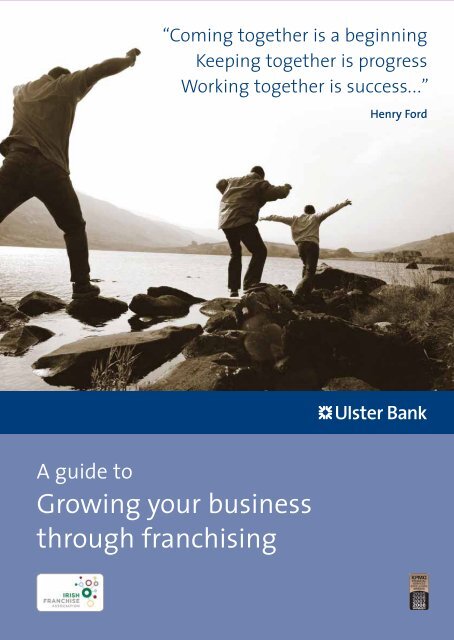

![[PDF] A guide to our personal accounts - Ulster Bank](https://img.yumpu.com/51190166/1/166x260/pdf-a-guide-to-our-personal-accounts-ulster-bank.jpg?quality=85)

